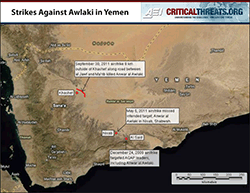{{currentView.title}}
September 30, 2011
Targeted Killings Can't be Total Strategy to Defeat al Qaeda
 |
The killing of al Qaeda leader Anwar al Awlaki in Yemen was a good and important step forward in the war against terrorists. Combined with the killing of Osama bin Laden in Pakistan and the subsequent killings of other al Qaeda leaders there, it deals a blow to the movement. The death of Awlaki is particularly important because it weakens al Qaeda in the Arabian Peninsula (AQAP), which is emerging as the most effective and dangerous al Qaeda franchise with global aims.
We must not, however, see in these killings a strategy for dismantling and defeating al Qaeda and preventing it from re-establishing itself—the president’s apt exposition of our overall aims in this conflict.
Senior-most leadership is important in this terrorist franchise network, make no mistake. The succession from Bin Laden to Ayman al Zawahiri caused turmoil within al Qaeda and will probably have long-term effects on the shape and development of that movement. Awlaki’s death will likely have somewhat less of an impact on AQAP, since he was neither its founder nor its principal leader, although his spiritual and recruiting functions will be difficult for the group to replace.
 |
But replace it they will if attacks against them are confined to strikes against the most high-profile and senior-most leadership. A number of al Qaeda franchises and fellow-traveller movements have gone through successful leadership transitions. U.S. forces killed al Qaeda in Iraq founder and leader Abu Musab al Zarqawi in June 2006. He was rapidly replaced by a deputy, Abu Ayyub al Masri, who led the organization into an even more lethal and effective strategy aimed at fomenting sectarian civil war in Iraq in 2006, at which he nearly succeeded. The Haqqani insurgent network has seen the leadership torch passed from its founder and patriarch, Jalaluddin Haqqani, to his son Sirajuddin, and the lethality and effectiveness of that group increased as well. The killing of Tehrik-e Taliban-e Pakistan founder and leader Beitullah Mehsud—who was responsible for the assassination of Benazir Bhutto—has had a more significant effect on that group, which has splintered under the pressure of his death, limited Pakistani operations, and resumed the tribal infighting that Beitullah Mehsud had worked hard to overcome.
The splinters, however, continue to fight both the U.S. and Pakistan, and that group is far from defeated.
The effect of Zawahiri’s succession to the leadership mantle of the core al Qaeda group remains to be seen, but that is the exception that proves the rule. The U.S. and Pakistan have been aggressively and effectively targeting senior- and mid-level leadership of the core al Qaeda group for a decade.
We have removed not only the founder and leader, but numerous operational commanders, facilitators, trainers, and others. In the case of operational commanders, we have killed successors to the successors many times.
Zawahiri thus takes control over a group that has been severely degraded by constant pressure against leadership at all levels, not just the top. His group, moreover, does not control territory within Pakistan any more, leading either a comfortable but hidden existence as bin Laden did, or a more flitting and migratory existence as most of the facilitators do. All of that pressure has been essential to reducing the effectiveness of the core al Qaeda group to its current level, and the killing of bin Laden, important though it was, was just another piece of a robust strategy that denied al Qaeda Central concentrated safe-havens and continually disrupted the network’s leadership at all levels. It is also worth noting that Pakistan has generally been very supportive of U.S. efforts directly focused against al Qaeda, debates over ISI knowledge or ignorance of bin Laden’s hideaway in Abbottabad notwithstanding.
The U.S. is pursuing no such strategy against AQAP. The group currently has safe-haven within Yemen, and the chaos surrounding the spread of the Arab Spring to Sana’a has allowed it to expand that safe haven. Neither American nor Yemeni forces are seriously challenging the major support areas that AQAP has already established—the fighting in Southern Yemen against AQAP is aimed at limiting its expansion rather than reducing its base. We have not been able to muster the same kind of top-to-bottom pressure on AQAP through targeted strikes, moreover, as we have conducted against al Qaeda central.
We don’t have the bases or intelligence needed to do so in a theater with virtually no U.S. presence and very limited cooperation from local security forces. The prospects for developing that kind of infrastructure in Yemen are very poor.
The notion that the targeted killings of a handful of key leaders of al Qaeda franchises around the world will end the terror threat to the U.S. cheaply, quickly, and efficiently is seductive but wrong. We have far too much evidence to show that committed terrorist organizations can and do replace leaders faster than we can kill them, and that the replacements can lead the movements as well or sometimes better than their deceased predecessors. It takes the kind of sustained, high-tempo, focused operations we have directed against the core al Qaeda group to reduce the threat of such an enemy significantly, but we do not have the capabilities ourselves or the capable partners in Yemen, Somalia, and elsewhere to repeat that exercise.
Killings of high-profile terrorist leaders are important both symbolically and practically. President Obama and his team are to be congratulated on their recent successes, and may they continue. But we must not confuse those successes with a strategy, or allow these news-grabbing positive events to conceal the reality that al Qaeda in the Arabian Peninsula remains a virulent organization that will continue to threaten the U.S. directly and indirectly until and unless we can develop, articulate, and implement a more comprehensive strategy to attack and defeat that network than we have yet done.
